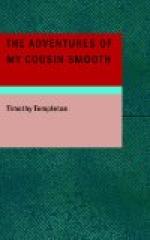as well qualified to sway the destinies of discontented
England as a virgin pumpkin; and together with my ever
amiable Lord Clarendon, would set a world at war good-naturedly.
These very high functionaries, Mr. Smooth was informed,
could not at present be seen by common people, inasmuch
as they were contemplating the problem:—’I
don’t know what to do!’ Nicholas’s
appetite for Turkey breakfasts had made work too profound
for the brains of Downing Street. ’Don’t
seem a subject of this atmosphere,’ said the
stupid, significantly canting his head, and giving
a queer look out of the corner of his right eye.
‘You fellows don’t seem to know me,’
I interpolated, ’Citizen Smooth—they
call me Solomon Smooth, Esq., that is my name.’
A door now opened near where I was standing, and in
I walked—right among the Dukes and dough-heads.
It only wanted a bold push, in the right go-ahead
sort of way, to make myself respected. Dukes were
not only flesh and blood, but owed much of their importance
to the ignorance of the people they aspired to frown
upon. Dukes, Earls, and Lords, were, at this
moment, playing at very un-English games for England.
They affected to believe it right that the loyal people
(I mean the simple and vulgar, who have hitherto proved
mean the simple and vulgar) who have hitherto proved
true to their noble traditions, should remain ignorant
of the game played at their expense. This, Mr.
Smooth thought too bad; however, his friend Urquhart
was devising a scheme for remedying the evil, which,
did he not himself fall into evil, might do great
good to the nation in general. But Urquhart was
so modest that he never accused Lord Palmerston of
anything worse than bringing about the potato rot
in Ireland. ‘Hallo hallo!’ a dozen
voices echoed from the table around which the all-accomplished
sat:—’A rustic intruder is upon us!’
half muttered the man who followed me in. ’It’s
only Solomon Smooth, Esq., from the Cape,’ returned
I, with a good, wholesome laugh. Believe me,
Uncle Sam, there sat round a table ten of the most
solemn-looking fellows, with faces as dreary as a wet
moon in November. Some of this unique body looked
as if they had seen hard usage and lean pay.
Others were grey with thinking, instead of moving.
Be not surprised either when I say that the gravity
of their countenance left no visible room for anything
else. Hard at it were they, straining their antiquated
imaginations over a secret game of thimble-rig, which
seemed of momentous importance. Only five, however,
could play at the game; and Sawny Dablerdeen, who always
played on two small pipes, and paid sundry small pipers
to do a deal of blowing, seemed in the greatest fuddle.
And then there was my Lord John Littlejohn, as crusty
a little snap as ever declaimed against tyrant in
one breath, or turned a political summersault in another;—bricks
to the back-bone was he, and all for old England, though
he was not bigger than one of Betsy Perkin’s
well-grown cucumbers, and could be turned to as many




